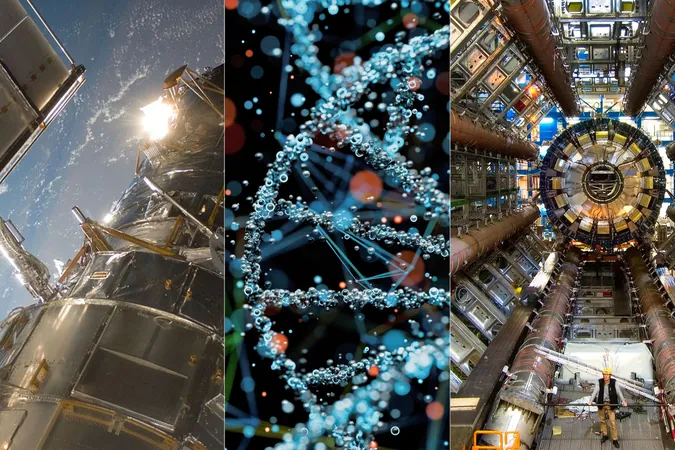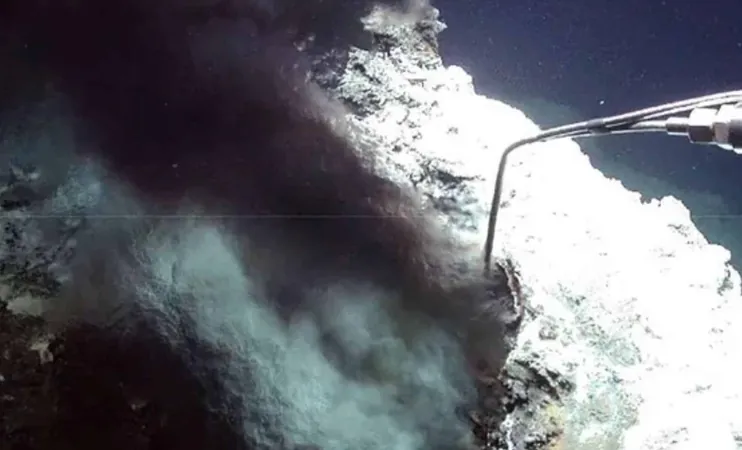
Shocking Discovery: Oxygen Can Form Without Life on Other Worlds!
2025-01-04
Author: Jacob
Groundbreaking Findings on Oxygen Production
Scientists have made a groundbreaking finding that could revolutionize our understanding of oxygen production in carbon dioxide-rich atmospheres. This new research reveals that molecular oxygen (O2) can be generated without any biological contributions, raising questions about how we detect potential life on other planets.
Redefining Life's Signature
Traditionally, the presence of oxygen has been seen as a hallmark of life. However, recent work by researchers Shan Xi Tian and Jie Hu from the University of Science and Technology of China suggests a different story. They identified an unexpected chemical reaction whereby helium ions (He+) combine with carbon dioxide (CO2) to produce oxygen. Utilizing state-of-the-art technology such as time-of-flight mass spectrometry and ion velocity mapping, the team successfully replicated this non-biological reaction under controlled laboratory conditions.
Implications for Mars Research
This discovery is particularly exciting for the study of Mars, a planet whose atmosphere is heavily composed of CO2. Solar winds produce helium ions that could easily interact with carbon dioxide, thus potentially leading to the formation of molecular oxygen in the Martian upper atmosphere. Although researchers have detected various ions in Mars' ionosphere, such as O+, O2+, and CO2+, concrete evidence for oxygen from this evolutionary pathway remains to be demonstrated.
Changes in Planetary Science
Dr. David Benoit, a Senior Lecturer in Molecular Physics and Astrochemistry at the University of Hull, highlighted the significance of this discovery for the field of planetary science. He noted that it broadens our understanding of how oxygen forms in different planetary environments and may necessitate revisions to the astrochemical models used to predict conditions on exoplanets—planets outside our solar system that may harbor life.
A Paradigm Shift in Astrobiology
The implications of this research are vast: the simultaneous existence of CO2, helium, and oxygen might suggest that oxygen can arise from abiotic, or non-life-related, processes. This challenges existing methodologies and theories on how scientists search for signs of life on distant worlds, now prompting a reevaluation of what atmospheric chemistry could mean for the potential for life.
Conclusion and Future Outlook
As humanity continues its quest to explore the cosmos, this paradigm shift in our understanding of oxygen formation might just be the key to unlocking the secrets of life beyond Earth, shedding new light on the mysteries of planetary evolution. What does this mean for future space missions and our search for extraterrestrial life? Stay tuned for more updates as the story develops!









 Brasil (PT)
Brasil (PT)
 Canada (EN)
Canada (EN)
 Chile (ES)
Chile (ES)
 Česko (CS)
Česko (CS)
 대한민국 (KO)
대한민국 (KO)
 España (ES)
España (ES)
 France (FR)
France (FR)
 Hong Kong (EN)
Hong Kong (EN)
 Italia (IT)
Italia (IT)
 日本 (JA)
日本 (JA)
 Magyarország (HU)
Magyarország (HU)
 Norge (NO)
Norge (NO)
 Polska (PL)
Polska (PL)
 Schweiz (DE)
Schweiz (DE)
 Singapore (EN)
Singapore (EN)
 Sverige (SV)
Sverige (SV)
 Suomi (FI)
Suomi (FI)
 Türkiye (TR)
Türkiye (TR)
 الإمارات العربية المتحدة (AR)
الإمارات العربية المتحدة (AR)